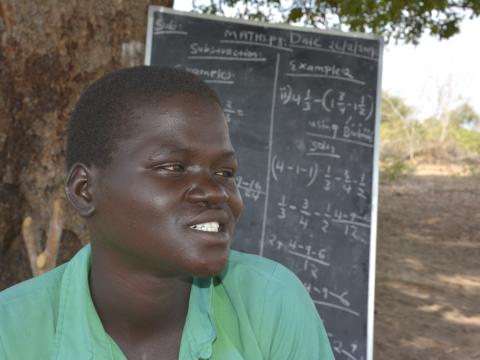Education keeps girls in school and out of early marriage in South Sudan

By Zipporah Karani, Communications Coordinator
Rebecca, 15, wanted to become a doctor someday.
A beneficiary of the Girl Incentive Program, Rebecca receives 9.9 kilograms of cereal and 3.6 kilograms of vegetable oil per month as long as she attends at least 80% of school days in a month.
The food is shared with her family. “Going to school and getting an education is my own choice. Being part of the program further encourages me to learn. As a girl, it makes me feel good to be supported”, says Rebecca.

In an effort to support more girls to have access to education, World Vision land the World Food Programme (WFP) aunched the program. It encourages girls to enrol in school and attend class regularly in return for food rations that they can take home to help ease their families’ food needs.
A total of 1,558 girls from 21 primary schools in Tonj North County in South Sudan's Warrap State have been identified in 2018. This increased to 5,448 girls in 2019. The food ration incentive is only given in primary schools identified as having the lowest rates of enrolment of girls and given to those in grades 3 to 8. They are required to attend classes for at least 18 out of 22 days.
“The girl's incentive is also known as vulnerability incentive and implementation is running smoothly,” says Project Manager Ekra Komenan. But he is also aware of the complaints why boys are not part of the program. During meetings, World Vision’s team explains the purpose of the program to help people understand its purpose.

One of the reasons why the program targets girls in higher grades that those in the lower classes to help discourage them from marrying early and focus on their studies. Rebecca said many or her peers got married but she is determined of finishing school.
Andrea Chol, 45, has been a local primary school head teacher for the past 15 years. He appreciates the impact of the girl incentive program but has concerns on how everyone can be accommodated. “We do not have enough classrooms in the school and it is a challenge to support all children”, says the head teacher.
o help address this, World Vision works closely with the State Ministry of Education, Science, and Technology. UNICEF will construct additional classrooms in Tonj North county to address the need.

The 2018 joint report by the Global Initiative on Out of School Children in South Sudan reveals that an estimated 2.4 million children are out of school. In the next two years, the figure is projected to increase further to 200,000 due to the ongoing conflict, economic collapse and worsening food insecurity.
To help address this, World Vision works closely with the State Ministry of Education, Science, and Technology. UNICEF will construct additional classrooms in Tonj North county to address the need.
The 2018 joint report by the Global Initiative on Out of School Children in South Sudan reveals that an estimated 2.4 million children are out of school. In the next two years, the figure is projected to increase further to 200,000 due to the ongoing conflict, economic collapse and worsening food insecurity.